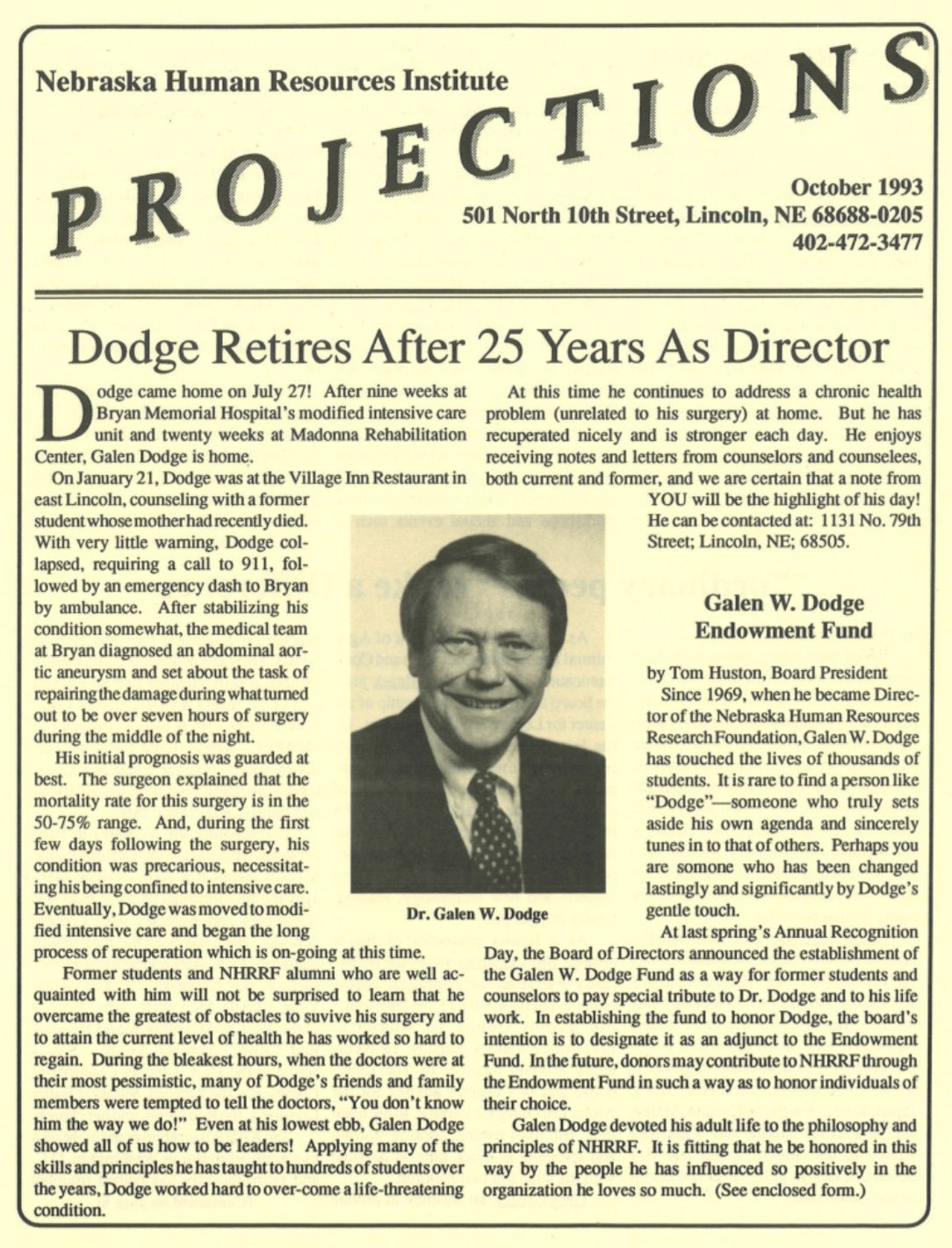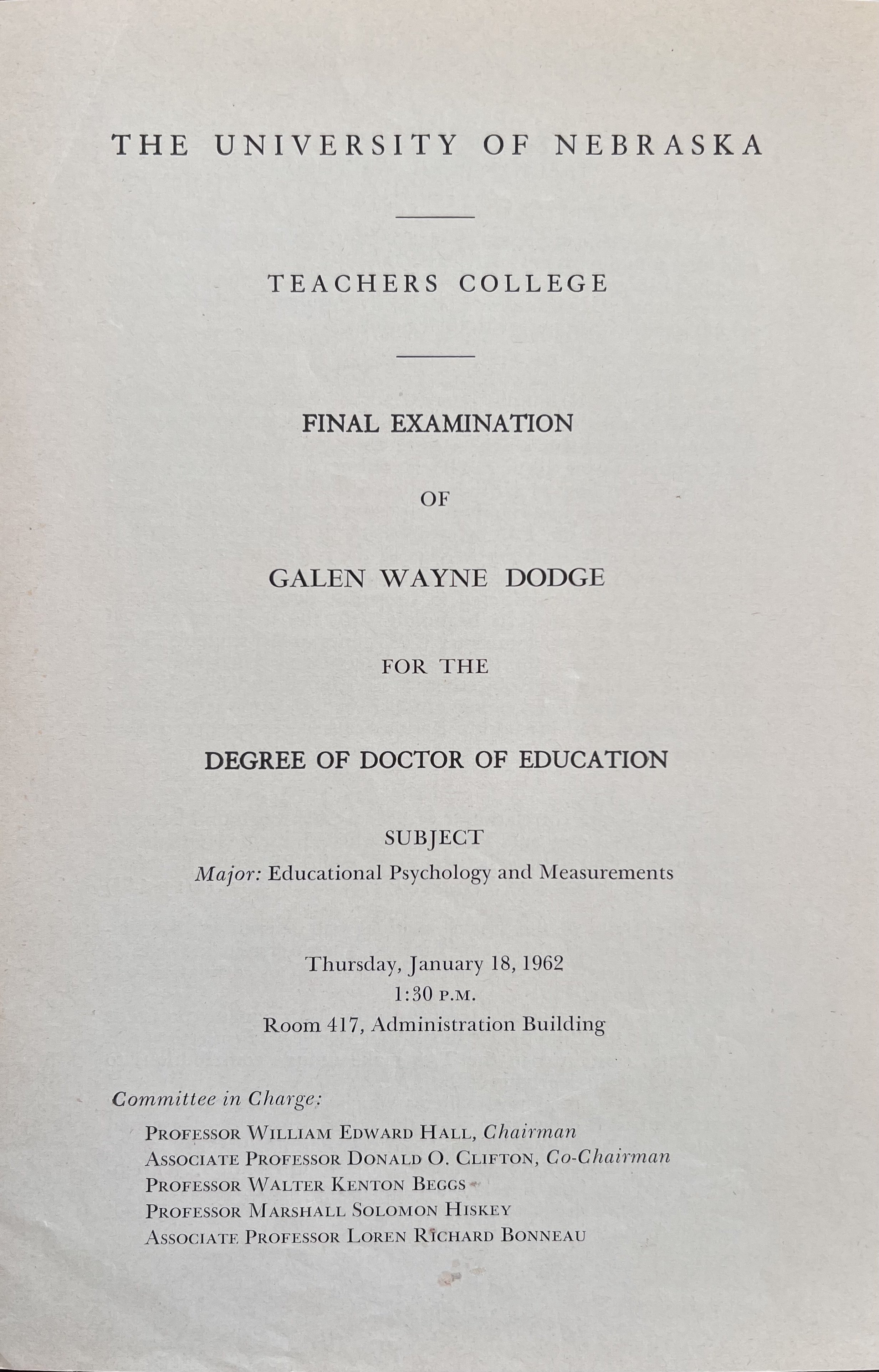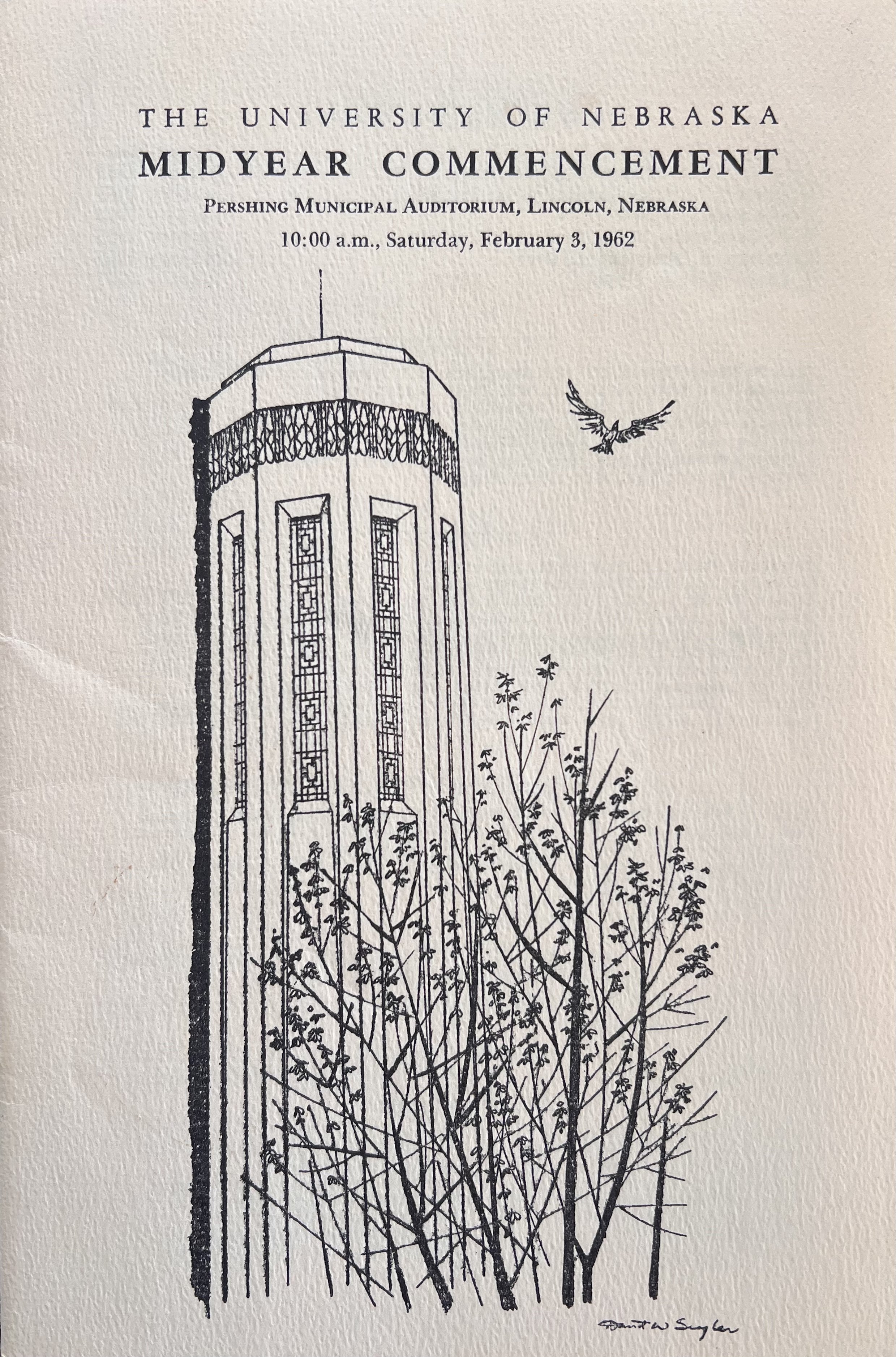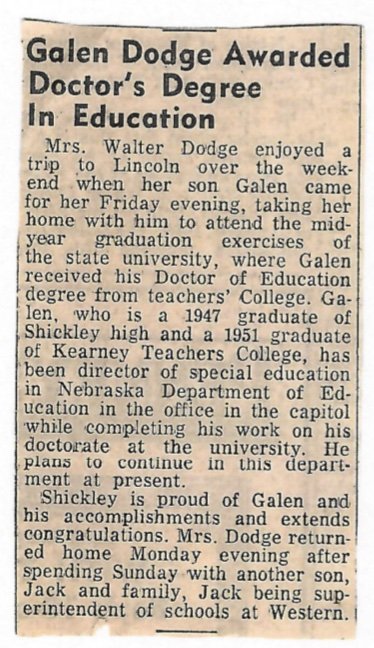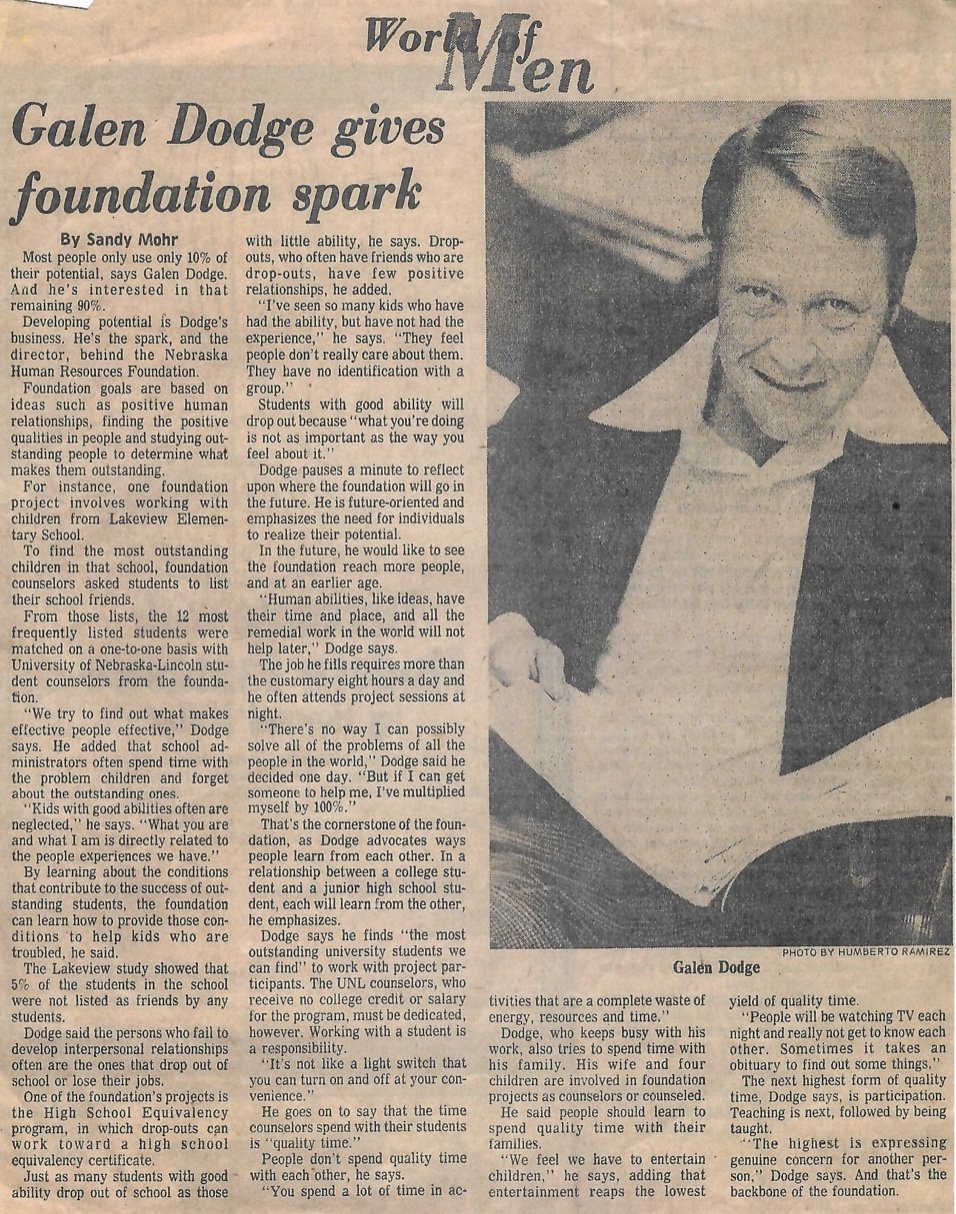Story 4 - Dr. Galen W. Dodge
Before leaving the University of Nebraska, Drs. Hall and Clifton reached out to a promising scholar who had been deeply influenced by their mentorship—Dr. Galen Dodge. At the time, Dodge was serving as a faculty member at Peru State Teachers College in Peru, Nebraska. As a graduate student, he had an excellent grasp of the theories and principles that guided the “Foundation.” Dodge became Director of the Nebraska Human Resources Research Foundation and served in this role for 28 years.
Chief among Dodge’s first tasks upon assuming leadership of the Foundation was the establishment of new sources of funding. Understaffed and underfunded, the program would have folded without an immediate infusion of both people and funds. This was neither the first nor the last time the program set about the reinvention of itself.
Dr. Dodge wanted more students at the university to be exposed to the philosophy of the Nebraska Human Resources Foundation. He believed the class would benefit all students, and he wanted it to have a home where students from all colleges would have access to it. Ultimately, the class was picked up by the Agricultural Communication Department, which evolved into the Agricultural Leadership, Education and Communication (AgLEC) Department. Ag Ed 102 became one of the most sought-after classes on the University of Nebraska campus, with Dodge teaching up to six sections per semester and many more students wanting to enroll than could be accommodated. Teaching so many sections of the class justified a major share of Dodge’s salary being paid by the university, with only a minor portion paid by the Foundation.
A further benefit of Dodge’s teaching was the exposure given to the Foundation, resulting in nearly endless possibilities for new counselor recruitment. Dodge taught his classes, served as Director of the Foundation, and facilitated leadership workshops and training sessions throughout the State of Nebraska, the latter of which yielded income for the Foundation. During the summer of 1986, the Nebraska Human Resources Research Foundation published “Priceless People,” a guide for human resource development. Compiled by Dodge, the book became the text for Dodge’s classes.
After 28 years as Director, Dodge’s departure represented the end of a truly incredible era. Students came first with Dodge, and, because they sensed this in him, they came to him in droves. If a counselor showed up at his office door with a problem, Dodge set everything else aside. From then until the student left, nothing else on earth mattered. He was an exceptional listener with a nearly uncanny ability to help others convert failures and disappointments into successes and victories. It would be highly unlikely for anyone to leave his office feeling as unhappy as when they arrived. That is because Galen Dodge consistently looked for possibilities in the lives of people.
Dr. Dodge was a perfect role model for everyone connected to the program because he was the personification of the program’s principles, techniques, and concepts. He lived his life in congruence with the highest ideals of NHRI, relating effectively to everyone he met. “A stranger is simply a friend you haven’t yet met,” he would say. A man of principle and integrity, Dodge found good in every person and was quick to point out to others the strengths he saw in them. Little wonder that lines formed at his door. His former students readily recall the sparkle in his blue eyes, the smile on his face, and the boisterous “HELLO THERE!” that greeted them each time he saw them. His love of people was demonstrated in a thousand ways. He loved to laugh, and his well-developed sense of humor added zest to the mix he brought into others’ lives.
Dodge brought his high sense of fun into the classroom too, convinced that learning can be and should be fun. A storyteller of the first rank, Dodge reinforced class concepts through the liberal use of personal anecdotes and stories. This man touched thousands of lives while simultaneously imprinting his own style on NHRI. His leadership will surely be felt for years.
Galen Dodge passed away in November 1994, following a lengthy series of illnesses. His legacy, however, continues to thrive through the lives of those he touched.
Dodge’s Early Life
Galen Wayne Dodge was born one of ten children on July 17, 1930 in Shickley Nebraska. His parents were Walter and Cathryn (Portwood) Dodge. Galen intended to stay in Shickley after his high school graduation and work as an auto mechanic. The Superintendent of Schools in Shickley recognized Dodge's potential and encouraged him to further his education. Galen was awarded a scholarship to Kearney State College where he earned a Bachelor's degree in Education in 1951. Galen W. Dodge and Emalyn Weist were united in marriage the day Dodge graduated from college on May 24, 1951.
The Korean War further developed Galen's discipline and desire to work with people. Dodge qualified for educational benefits and began a Masters degree in Education at the University of Nebraska in 1955. He later received his Doctorate of Education from the University of Nebraska in 1962.
NHRRF Projections Newsletter, February 1968
Except for time spent with the V.A. Regional Office as a Psychologist, with the Office of Special Education, as Director, and with Peru State College, where he served as Professor of Psychology and Director of Testing, Counseling, and Financial Aid, Galen Dodge committed his professional life to the Nebraska Human Resources Research Institute as its Director. Dr. Dodge’s four children: Steve, Scott, Jenny and Kathy were all involved in NHRRF.
Dodge was the recipient of numerous awards, including: Honorary Membership Innocence Society and Mortar Board at UNL; the Sue Tidball Award for Creative Humanity in 1988; the E.B. Knight Journal Award in 1991; Stuart Leadership Program Award for Excellence in Community Service in 1991; Campus-wide Distinguished Teaching Award and University of Nebraska Foundation Trustees Award in 1991.
By Keith Berns, Junior Project, 1987
Dr. Dodge was a rare kind of person. He had this rugged exterior, a presence that could be a bit intimidating at first, but once you got past that, you found someone with an incredibly warm heart. When he asked, “How are you doing?” it was never in passing. If you gave him the typical “Oh, I’m fine,” he would lean in with that gravelly voice and ask, “No ... Really, how are you doing?” He wouldn’t accept a surface answer because he genuinely wanted to know, and he made you feel like you could share the real stuff.
Looking back, I realize he was probably one of the busiest people I knew at the time. As a college student, I thought I knew what busy was - but Dr. Dodge was juggling a world of people and responsibilities and commitments and still took time to listen to anyone who needed it. His ability to put other people’s needs first was a true reflection of his values, and that’s one of the biggest ways he “walked the walk.” It humbles me even now; I don’t always go as deep as he did when I ask how someone’s doing, and sometimes I feel guilty for that. But his example - his persistence in caring - has stayed with me. He wouldn’t let go until you really shared from your heart and he really understood where you were at, and that left an impact that’s hard to forget.
That impact allowed me to take the leadership and relational concepts that I learned from Dr. Dodge and put them into practice and action in a real life setting. After graduation I became an Agricultural Education teacher at Fairbury High School, and I convinced the school board to allow me to offer a Human Relations class where I could share and teach these valuable concepts. It was a very effective class and really changed the lives of those students - not because of me, but because of what I had learned from Dr. Dodge.
“Teaching was his ministry.”
“In my view, if there were ever anyone deserving of the Distinguished Teaching award it is Dr. Galen Dodge. He deserves much greater than that. I suspect he’ll get those in heaven.”
“Three words I would use to describe Dr. Dodge are: relationship, talents, and human capital; because that is what he was all about. If I took those three words, I could make a lifetime career of personal development. Dr. Dodge looked for the good in whatever happened. He always seemed to find what I call the “positive” in just about anything.
I’d like the whole premise of Priceless People to be shared with other people - we need so much more of that today. It’s simple, here’s some things you can do. They don’t cost anything and make the world a better place!”
“The three words that came to my mind were wise, humorous, and sneaky, because it was kind of sneaky humor. He could be very deadpan. And then you would catch it. And he would glaze, and he would grin. I don’t know how old he was when we were there. But he sure could relate to us in a marvelous way. And, he had a nice pace for talking. There would be enough pauses that would make an impact. And the words were well chosen. If I could, there are a couple of people I would like to speak to in the same way. And he would be one of those.”
Excerpt from Jan Kauffman’s nomination letter for Dr. Dodge’s UNL Distinguished Teaching Award
“It is unusual to find a person like Dr. Dodge anywhere, anytime. It is most fortunate for the UNL community that he has devoted his energy to the students and the people who make up our campus citizenry. His life focus has concentrated consistently on helping others to become the very best they can be. Consequently, literally hundreds of students are drawn to him; for they are keenly aware of "the magic" he is able to work in their lives. He is a person who is sincerely devoted and committed to the idea that it is possible to "believe a person into becoming." With the many demands on his time and energy, he always finds time for students. His door is open to everyone who seeks his help and guidance.
After more than twenty-five years at UNL, Dr. Dodge has developed deep and lasting relationships with thousands of alumni from across the country, many of whom remain in regular contact with him. It is typical for many of these people to continue to seek his counsel, even though they may have left the university long ago. It is not unusual for former students to drop by his office in the 50l Building when they are passing through Lincoln. I have had numerous conversations with many of them, and they tell me that “It's 'Dodge I remember the most vividly whenever I look back at college." How can any of us measure the kind of lasting, positive influence this man has exerted in the lives of his students? The lessons they learned from him, the lasting impressions he made on them are literally priceless and impossible to quantify through normal measuring procedures.”
30 Years Later
On November 4, 2024, alumni, students and friends of NHRI gathered to celebrate the program’s 75th anniversary. During the evening’s event, Kathy Dodge Clay, daughter of Dr. Dodge shared many heartwarming memories of her father. 30 years earlier, to the exact date - November 4, 1994, published in the Lincoln Journal Star was one of many tributes in honor of Dr. Dodge. Dr. Dodge passed away at 64 years old on November 1, 1994.
Dr. Dodge’s influence is weaved throughout many of our 75 stories and history.


